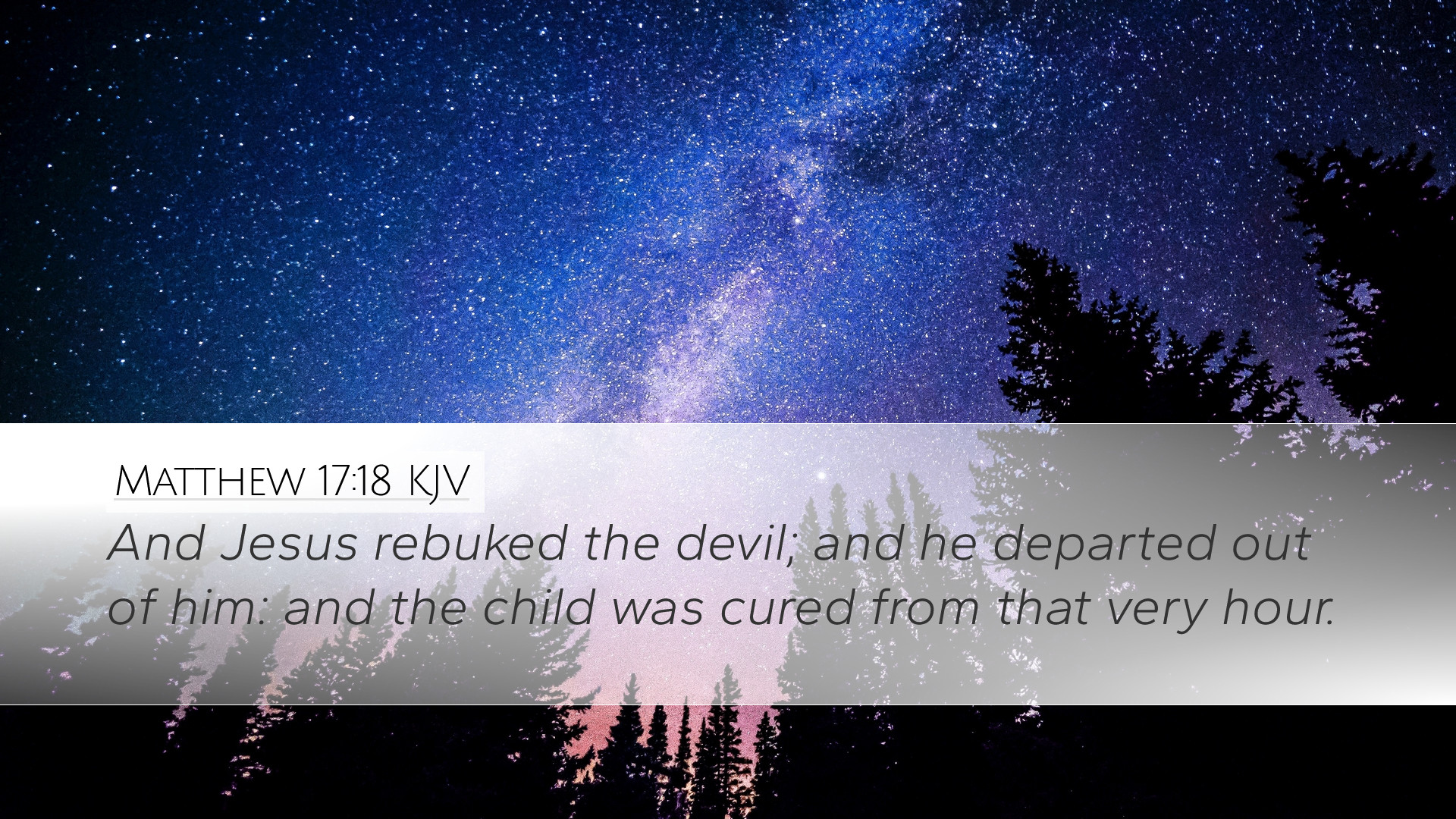Commentary on Matthew 17:18
Bible Verse: "And Jesus rebuked the demon; and he departed out of him: and the child was cured from that very hour." (Matthew 17:18)
Introduction
This verse is a pivotal passage in the narrative of the Gospel of Matthew, encapsulating the power of Jesus over demonic forces and His authority as the Messiah. The interaction between Jesus, His disciples, and the afflicted boy illustrates themes of faith, authority, and divine healing. The commentaries of Matthew Henry, Albert Barnes, and Adam Clarke provide profound insights into the implications of this event, making it deeply relevant for pastors, theologians, and students of the Bible.
Contextual Background
The surrounding narrative offers important context. In Matthew 17, we find the account of the Transfiguration, where Jesus reveals His glory to Peter, James, and John. Following this mountaintop experience, they encounter a contrasting situation in the valley as a boy possessed by a demon is brought to the disciples, who fail to heal him. This sets the stage for Jesus’ intervention and His subsequent teachings.
The Authority of Jesus
Both Matthew Henry and Albert Barnes emphasize the authority of Jesus in this passage. Jesus’ ability to command the demon reflects not only His divine power but also His role as the Messiah:
- Divine Nature: Matthew Henry notes that the effectiveness of Jesus’ rebuke highlights His divine nature, as even the demons recognize His authority.
- Fulfillment of Prophecy: Barnes points out that Jesus' actions fulfill prophetic expectations regarding the Messiah's power over evil spirits.
The Role of Faith
Adam Clarke delves into the theme of faith, particularly regarding the disciples’ inability to cure the boy:
- Lessons in Faith: Clarke asserts that Jesus' rebuke of the disciples was not merely due to their lack of skill, but a lack of faith. He underscores the importance of a strong faith foundational to effective ministry.
- Disciples’ Struggle: The disciples' struggle with faith serves as a reminder for modern believers that reliance on God’s power, rather than their own, is essential for spiritual efficacy.
The Nature of Demonic Oppression
The passage also sheds light on the nature of demonic oppression and the need for deliverance, demonstrating its reality:
- Seriousness of the Demonic Condition: Henry notes the severity of the boy's condition as a testament to the destructiveness of sin and the demonic while calling for a sober view of spiritual warfare.
- Hope in Christ: Barnes highlights the hope that Jesus gives in the face of such darkness. The healing serves as an assurance that no affliction is beyond His reach.
The Miracle of Healing
This verse concludes with the miraculous healing of the boy:
- Immediate Transformation: The phrase "from that very hour" signifies the immediacy of the healing. Clarke emphasizes that this points to the authority of Jesus to change a person's condition instantaneously.
- Sign of God’s Kingdom: Henry notes that miracles serve as signs pointing to the nature of God's Kingdom, which is marked by healing and restoration.
Theological Implications
The implications of Matthew 17:18 extend beyond the immediate narrative:
- The Nature of Jesus’ Ministry: Jesus’ ministry encapsulates healing, deliverance, and reconciliation, reflecting God’s divine compassion.
- Call to Faith and Action: Reflecting on Jesus’ teaching, the church is called to engage in faith-filled action, trusting in His authority to bring healing and restoration.
Conclusion
Matthew 17:18 offers profound insights into the person and work of Jesus. With its focus on His authority, the necessity of faith, and the reality of demonic oppression, this verse challenges and encourages contemporary believers. As pastors, theologians, and students reflect upon this passage, may they be inspired to pursue a deeper reliance on Christ’s power and to engage in the work of bringing hope and healing to those in need.


